
Michele Placido is an Italian actor, director and screenwriter. He began his career on stage, and first gained mainstream attention through a series of roles in films directed by the likes of Mario Monicelli and Marco Bellocchio, winning the Berlinale's Silver Bear for Best Actor for his performance in the 1979 film Ernesto. He is known internationally for portraying police inspector Corrado Cattani on the crime drama television series La piovra (1984–2001). Placido's directorial debut, Pummarò, was screened Un Certain Regard at the 1990 Cannes Film Festival. Three of his films have competed for the Golden Lion at the Venice Film Festival. He is a five-time Nastro d'Argento and four-time David di Donatello winner. In 2021, Placido was appointed President of the Teatro Comunale in Ferrara.

Associazione Calcio Reggiana, commonly referred to as Reggiana, is a professional football club based in Reggio Emilia, Emilia-Romagna, Italy. The club was formed in 1919, reformed in 2005 and 2018 after going bankrupt twice, and currently plays in the Serie B, the second tier of Italian football. Reggiana is known as i Granata in reference to the club's main colour: maroon.
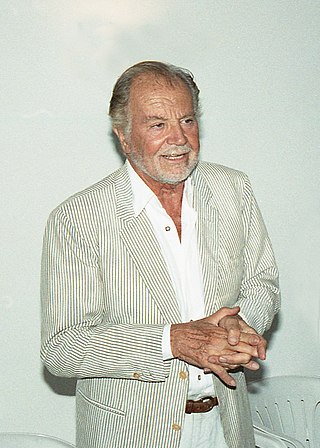
Gabriele Ferzetti was an Italian actor with more than 160 credits across film, television, and stage. His career was at its peak in the 1950s and 1960s.

Rosario Tindaro Fiorello, known just as Fiorello, is an Italian comedian, singer, radio and television presenter.

Italy competed at the 1936 Summer Olympics in Berlin, Germany. 244 competitors, 228 men and 16 women, took part in 99 events in 17 sports.

Aldo Fabrizi was an Italian actor, director, screenwriter and comedian, best known for the role of the heroic priest in Roberto Rossellini's Rome, Open City and as partner of Totò in a number of successful comedies.

Franco Fabrizi was an Italian actor.

The Emperor of Capri is a 1949 Italian comedy film directed by Luigi Comencini and starring Totò, Yvonne Sanson and Marisa Merlini.

Furio Scarpelli, also called Scarpelli, was an Italian screenwriter, famous for his collaboration on numerous commedia all'italiana films with Agenore Incrocci, forming the duo Age & Scarpelli.
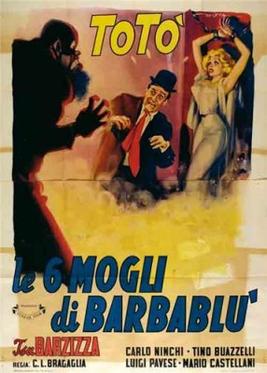
Bluebeard's Six Wives is a 1950 Italian comedy film directed by Carlo Ludovico Bragaglia, and starring Totò, Isa Barzizza and Carlo Ninchi. The film's sets were designed by the art directors Alberto Boccianti and Mario Rappini.

The art collections of Fondazione Cariplo are a gallery of artworks with a significant historical and artistic value owned by Fondazione Cariplo in Italy. It consists of 767 paintings, 116 sculptures, 51 objects and furnishings dating from the first century AD to the second half of the twentieth.
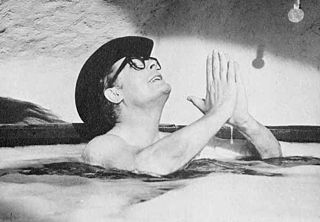
The list of the A hundred Italian films to be saved was created with the aim to report "100 films that have changed the collective memory of the country between 1942 and 1978". Film preservation, or film restoration, describes a series of ongoing efforts among film historians, archivists, museums, cinematheques, and nonprofit organization to rescue decaying film stock and preserve the images they contain. In the widest sense, preservation assures that a movie will continue to exist in as close to its original form as possible.
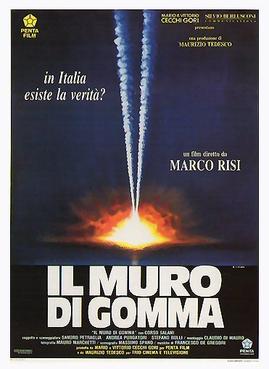
The Invisible Wall is a 1991 Italian drama film directed by Marco Risi. The film, which deals with the crash of Itavia Flight 870, entered the competition at the 48th Venice International Film Festival.

Eternal Melodies is a 1940 Italian historical drama film directed by Carmine Gallone and starring Gino Cervi, Conchita Montenegro and Luisella Beghi. It was one of several musical biopics directed by Gallone. The film was shot at Cinecittà in Rome.
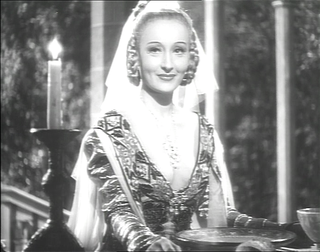
The Jester's Supper is a 1942 Italian historical film directed by Alessandro Blasetti and starring Amedeo Nazzari, Osvaldo Valenti and Clara Calamai. It was based on a play of the same title by Sem Benelli, which had later been turned into an opera by Umberto Giordano. Like the play, the film is set in the 15th century Florence of Lorenzo the Magnificent and portrays a rivalry that leads to a series of increasingly violent practical jokes.
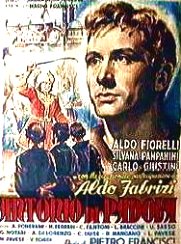
Anthony of Padua is a 1949 Italian historical drama film directed by Pietro Francisci and starring Aldo Fiorelli, Silvana Pampanini and Carlo Giustini. The film portrays the life of Anthony of Padua (1195–1231).
The Knight of the Black Sword is a 1956 Italian historical adventure film directed by László Kish and Luigi Capuano and starring Marina Berti, Steve Barclay and Otello Toso.

The Hero of Venice is a 1941 Italian historical adventure film directed by Carlo Campogalliani and starring Gustav Diessl, Paola Barbara, Rossano Brazzi and Valentina Cortese.

















